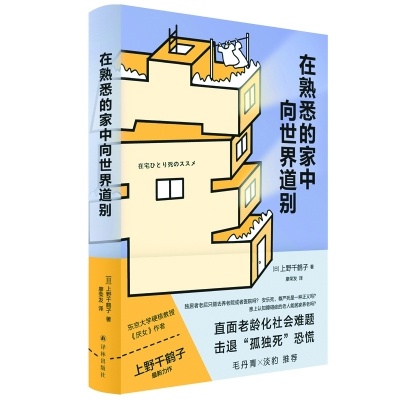"Farewell to the world in a familiar home"
Author:Changjiang Daily Time:2022.08.09

"Farewell to the World in the Familiar Home"
[Day] Ueno Chiyozi
Translation Lin Publishing House
Recently introduced the newly introduced Japanese social scholar Ueno Chiyo's new book "Farewell to the World in the Familiar House". Through a comprehensive investigation of the latest situations such as Japanese medical care, care, and nursing, he shared his preparations for his old life. Bringing the reader's confidence that "a person can be realized with dignity at home". At the moment when an aging society is approaching and the population of alone has gradually increased, her observations and experiences can provide us with some beneficial references.
All the troubles and problems faced by the old man should be studied strongly
A doctor tells such a story.
The daughter of an old man stayed abroad when he was young. When he was middle -aged, he said that he was worried that her mother would do what she was old, so she returned to her mother. After a while, she came to the doctor to discuss and said, "I think my mother's state is abnormal, and I want to send her to the elderly institution."
The doctor stared at her face and said, "I think you should move out of that home."
If in Agasha Christie, this will be the beginning of a murder, involving rural villas, castles, inheritance or something; It is a case in the book "Farewell to the World in the Familiar Home", which reflects the new changes in Japanese aging society.
Ueno Qianhezi wrote: Later, the daughter had to rent a house nearby and moved out. After I heard that her mother's situation improved after she lived.
Ueno Chiyoko, Honorary Professor of Tokyo University, 74 years old, has no family and children, and lives alone; she has long studied Japan's aging problems and the problem of the elderly alone. In the "Postscript" of this book, she frankly wrote: "I have always said, I have been engaged in research for my own self -interest ... I have seen too many elderly people, I know that I can't expect to be healthy and healthy during my life, and die Suddenly suddenly. Death is like a downhill road. We can only go downhill slowly: slowly lose their ability to take care of themselves, can't eat meals, and can't drink things ... I think, if I live alone, I will be alone. Walking through this downhill road, and then died alone at home one day ... In the future, if I die quietly in the future, I will be discovered in a few days. I don’t want others to say that I am a lonely death. Write the motivation to write this book. "
In the nearly 20 years of studying aging issues in Ueno Chiyoko, the number of old people living alone in Japan has increased sharply, and the concept of Japanese society has also changed sharply.
The book refers to a special book of male weekly, which is about "when you become a person, you fail to do this", the list includes: "living with your children", "tuition for grandchildren", "paying property" Leave it to your children "," remarry "and so on.
Ueno Qianhezi couldn't help sighing: "Today's often realized that tomorrow is ridiculous, today's ridiculous cognition may be normal tomorrow."
When reading this book, reporters are often surprised that the concept of the Japanese is very different from us.
But concept is the product of social reality. Japan's medical care resources are very sufficient; Japan began to implement the "nursing insurance system" in 2000. Residents who are 40 years old are forced to join and pay premiums. The rate is generally 3%of the annual income of residents. Medical staff regularly on -door care, housework, etc., the expenses incurred by the cost of nursing insurance are paid 70%-90%, and the insured person pays 10%-30%by himself. Because the care insurance premiums are actually a tax, the local government is very scared It was said that it was "received tax but not provided services", so he set up a "nursing insurance department" and invested "the most elite civil servants". Even at the beginning of the stage, he visited households to see if there was a care insurance for nursing insurance. If you know this, you will understand that the changes in the concept of the Japanese are actually well -founded. Of course, the book also admits that after 20 years of operation, the Japanese government has become less generous and may have to "tighten" care insurance; the author wants to mobilize the public and defend this system.
However, "nursing insurance" does have far -reaching impact. A example of the book is an example. Mr. Shangcun, who lives alone over the age of eighty years old, has a cognitive disorder. He has always used "care insurance" and finally died at home. So how much did he spend in the last 3 months of life? Intersection Including doctors, nurses, nurses, drug expenses, transportation expenses, night care fees, and death certificates, about 70,000 to 80,000 yen per month, or about RMB 4,000.
Do not leave your familiar home easily, carefully consider the desire of the elderly
It is with such a social foundation and economic foundation that the elderly Japanese can not consider other factors, but decide whether to live with their own mood and preferences, and should live with their children.
At this step, human nature is actually connected. Talking with the number obtained by the survey in the book, "In fact, everyone understands that it is the most lonely for the elderly."
The author simply said: "I want to ask our media practitioners, don't just show the negative image of the resident, but also report their positive models. As long as we look around, we are not difficult to find. Living alone. "
The author proposes that "the old -age life of the heart" requires three conditions: the elderly should not leave their familiar homes; compared to the money, there should be some people (relatives and friends); the life that does not accommodate but disciplines others. This can understand the story at the beginning of this article. If you want to "dove the nest", and move the elderly to the elderly institution, let alone, at least it is not conducive to the physical and mental health of the elderly.
Since living alone is also good, the next question is logical, the so -called "lonely death". In this regard, the author believes that death is a gradual process. This process is seen by the nursing staff. When they think that the elderly are "fast", they will notify the children of the elderly to come over in time and bring them on the way, bring them on the way, and bring them on the way. Mourning.
Then, the author returned to the home, pointing out the real trick to prevent "loneliness": a lonely person lives a life of isolation and helpless during his lifetime, so as long as he is not isolated and helpless, you don't have to be afraid to die alone.
Next, the author "poisonous tongue": "Most of the lonely people are men, and they are 55 to 60 years old. These people are not even the elderly (in Japan, only 65 years old can be regarded as a 65 or more. Elderly) ... Lonely death is actually a problem of middle -aged and elderly men, not elderly women ... There is no need to be afraid to live alone. Why do you say that? Because unlike men, many women live alone have their own circle of friends. ... Japanese society thinks that office workers are social people, but do not think that housewives are social people. Strangely, the social experience and connections accumulated by male office workers for many years. Use the field ... And, most of the social experience and contacts of men are based on interest -based relationships. Without a stake relationship, it may not come and go. "
The author then believes that after divorce, Japanese men often abandon their original family, and as a "return", he will be abandoned by his family. This is also one of the reasons why Japanese men are likely to encounter "loneliness"; on the other hand, many Japanese elderly people are abandoned at home after their death, which is actually related to their families in order to continue to receive pensions.
Why did she say no to "Daily Bentes"
The book wrote: I do n’t want to be in a nursing home or in a hospital, but in my familiar home, we usher in the last time in their own way -this is probably the expectation of many people for their old age.
But there is a realistic question: What if the elderly have cognitive obstacles? According to Japanese official forecasts, by 2025, 7 million elderly people will have cognitive disorder. When you think of so many elderly people who have lost their ability to take care of themselves, gradually lose their memory, and even get feces on themselves, will they feel "relying on pension institutions"?
The author is disgusted with the elderly institution and pointed out that most of the elderly do not want to go by themselves, but have been sent by the family. She wrote decisively: "Even if it is a patient with cognitive disorder, as long as you bring the food in front of him, he will open his eyes to eat. After all, a person wants to live, and appetite is the key. Eat it boldly. "The author lists some examples of cognitive obstacles in academic predecessors, thinking that since everyone may suffer from cognitive impairment, instead of doing health exercises to prevent it, it is better to move towards a" affected affected Society that recognizes the obstacles after the obstacle. "
She wrote a case: a father suffered from cognitive disorder, he lived alone, and his son -in -law lived in a newly built house nearby. As soon as you enter the old man's house, the smell is smoky. When the caregiver came to the door, he could only clean it silently. The people around them are puzzled. The old man's son -in -law can obviously take his father to the newly built house. Why is it not so much? In fact, the old man's son was determined after discussing with the care assistant commissioner, and did not take his father over to live together, because his father's home was his father's house. In this way, the son protects his wife and exactly to protect the relationship between their husband and wife.
After reading this, the reporter also felt "weird" at first; but after thinking about it, if it was placed on the premise of the nursing insurance system, someone came to take care of the cleaning every day, then let the elderly live in a familiar house, even if it was even the familiar house, even if it was Being a lot of urination is better than living in a nursing home.
The book says: Eating, excretion, and bathing are the core of care. As long as these three pieces are fine, even if the memory is gradually lost, you can live happily! "If I am dementia in the future, then I hope that as long as I can eat it, please let me live."
From this perspective, the author also dislikes the "During the Illuminating".
The author's father is a late cancer. He himself is a doctor and knows the condition. Today he said, "Let me die early." But after a few days, he said, "I want to transfer to the rehabilitation hospital." At that time, he changed his hexagram again: "Forget it." The family was tossed by his undulating emotions. The author realizes from this experience and goes to death. Their mood will change and will swing. The true wishes that people write when they are healthy, "and" I no longer think that it will decide in advance. It is precious to the end. "
She wrote sharply: "(If you abandon medical treatment at a certain time according to the guidance of his lifetime, it is equivalent to) the past I was in the past, and I sentenced me to the present after experiencing the change ... When you keep unified, you still pursue the same nature of yourself. Isn't it that I used to be a kind of over -powered behavior in the past? ... (Regarding the citizens of my family and the medicalist, I heard it. ) So they do not have to hesitate or think about it, just perform the execution of the predecessor of their lifetime. "On the contrary, the author strongly praised a doctor that the doctor said" whether to take emergency rescue measures to the dying person. " On the question of life and death, there is no correct answer. As long as the family members and our staff are hesitant to the end. "
The reporter believes that this hesitation is a manifestation of humanity and tenderness. Humanity and tenderness are luxury goods, and they need economic strength and institutional guarantee to support it.
The last appeal of the book is very powerful: a society that allows living alone at home, and a society that allows their children to stay alone at home. A society that cannot make people feel at ease, the future of its young people must be very dangerous. We need to build a society where you can feel at ease even if you need care. A society that can live with peace of mind even if you have cognitive disorder. We have a lot of things to do.
(Yangjiang Daily reporter Li Yan)
【Edit: Wang Yujin】
For more exciting content, please download the "Da Wuhan" client in the major application markets.
- END -
International Observation: U.S. motion "Color Revolution" harms the world

Former US President's National Security Affairs Assistant Bolton recently publicly...
Hua Chunying refuted Peroisi Statement

Hua Chunying refutes Pelossey's statement: who is standing with the US politicians...